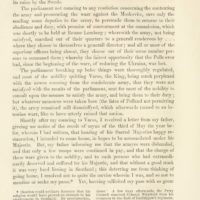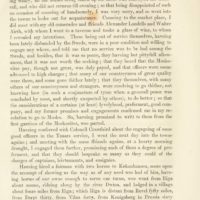![1661] DIARY OF PATRICK GORDON. 35 pressing earuestnes, and haveing rejected or refused the conditions offered 1661] DIARY OF PATRICK GORDON. 35 pressing earuestnes, and haveing rejected or refused the conditions offered](https://cdn2.picryl.com/photo/1699/12/31/1661-diary-of-patrick-gordon-35-pressing-earuestnes-and-haveing-rejected-or-ea31cd-1024.jpeg)
Related
![1661] DIARY OF PATRICK GORDON. 33 sence of the King](https://cdn2.picryl.com/thumbnail/1699/12/31/1661-diary-of-patrick-gordon-33-sence-of-the-king-a87f39-200.jpeg)
1661] DIARY OF PATRICK GORDON. 33 sence of the King

34 DIARY OF PATRICK GORDON. [1661 hired it ; the lodging or house belonging to that family
![1661] DIARY OF PATRICK GORDON. 39 small stock I had ; as for the 1000 reichs dollers promised me](https://cdn2.picryl.com/thumbnail/1699/12/31/1661-diary-of-patrick-gordon-39-small-stock-i-had-as-for-the-1000-reichs-dollers-a537cd-200.jpeg)
1661] DIARY OF PATRICK GORDON. 39 small stock I had ; as for the 1000 reichs dollers promised me
![1666] DIARY OF PATRICK GORDON. 63 noise, the Russes being unwilling to disoblige tbe Hollanders](https://cdn2.picryl.com/thumbnail/1699/12/31/1666-diary-of-patrick-gordon-63-noise-the-russes-being-unwilling-to-disoblige-aae600-200.jpeg)
1666] DIARY OF PATRICK GORDON. 63 noise, the Russes being unwilling to disoblige tbe Hollanders
![1694] DIARY OF PATRICK GORDON. 183 of all deadly ; consenting thir presents to be rcgistrate in the books of Counsell and Session](https://cdn2.picryl.com/thumbnail/1699/12/31/1694-diary-of-patrick-gordon-183-of-all-deadly-consenting-thir-presents-to-af29e6-200.jpeg)
1694] DIARY OF PATRICK GORDON. 183 of all deadly ; consenting thir presents to be rcgistrate in the books of Counsell and Session
![1654] DIARY OF PATRICK GORDON. 15 hoped to have found Duke Radzlvill](https://cdn2.picryl.com/thumbnail/1699/12/31/1654-diary-of-patrick-gordon-15-hoped-to-have-found-duke-radzlvill-e5cc52-200.jpeg)
1654] DIARY OF PATRICK GORDON. 15 hoped to have found Duke Radzlvill

42 DIARY OF PATRICK GORDON. [1661 misfortune
![1696] DIARY OF PATRICK GORDON. 185 for a just cause is rewarded](https://cdn2.picryl.com/thumbnail/1699/12/31/1696-diary-of-patrick-gordon-185-for-a-just-cause-is-rewarded-d5c23a-200.jpeg)
1696] DIARY OF PATRICK GORDON. 185 for a just cause is rewarded
![1690] DIARY OF PATRICK GORDON. 107 their arrival was announced. Gordon was at once admitted to His Majesty](https://cdn2.picryl.com/thumbnail/1699/12/31/1690-diary-of-patrick-gordon-107-their-arrival-was-announced-gordon-was-at-a59a57-200.jpeg)
1690] DIARY OF PATRICK GORDON. 107 their arrival was announced. Gordon was at once admitted to His Majesty
1661] DIARY OF PATRICK GORDON. 35 pressing earuestnes, and haveing rejected or refused the conditions offered
Summary
Passages from the diary of General Patrick Gordon of Auchleuchries : A.D. 1635-A.D. 1699"
1661] DIARY OF PATRICK GORDON. 35
pressing earuestnes, and haveing rejected or refused the conditions offered
me in Crosna, by Collouel Laniziinsky, to take a compagny, and which, he
told me, he did by the generall's command ; being afrayed that it might be
objected to me hereafter, I thought fitt to looke about me for other service,
though not to engage but upon good conditions. And, first, I had great
temptations from the Moskowitish ambassadours ; for haveing, by ordor, con-
ducted some of their chieffe officers to them, about their ransome, as also,
they haveing ransomed two officers from me, they very earnestly desired
their colonells to engage me in the Tzaars service, to the which I seemed
to give halfe a willing eare. So they promised that I should not be longer
detained as three yeares, one yeare whereoff to serve for major, and two for
lievtennent-colonell. Yet did I not accept of these offers, but only kept
them in hand, to have another string for my bow ; nor, perhaps, had ever
embraced them, if another accident had not fallen out.
About the same tyme, the Roman Emperours ambassadour, the Baron
d'Isola, gott orders from the Emperour to engage officers to levy a
regiment of horse ; to which purpose he engaged Lievtennant-collonell
Gordon, commonly called Steelhand, who, useiug all the pressing reasons
he could to perswade me to engage with him, telling me of the honourable
service, the good pay, with the advantage and easines of the levyes at this
tyme, wherewith being overcome, after mature consideration, I resolved to
engage ; and so wee entered into capitulation, fowre of us, to levy a regi-
ment of 800 horse. The persons were Steelhand, colonell ; Lievtennant-
collonell John Watson, Maior Davidson, and myself. I engaged to levy
two compleet compagnyes, being to receive for each horseman forty reichs
dollars, the nominating of the officers behig the colonells ; and I made an
apart capitulation with the colonell, being to take on officers for the two
compagnyes, except the ruitmaster, I myself to be eldest ruitmaster, and to
have thirty-fyve reichs dollers for each hor.seman tl;at I should bring to
muster place or rendevows above my two companyes. One of the reasons
which induced me to engage here, was the great advantage I expected by
the levying ; for I had notice that the Elector of Rrandeburg had disbanded
foure regiments of horse in Prussia, so that many would be glad to enter
into service againe, and I doubted not to bring my companyes and more to
the locality which wee were to have in Silesia, and the rendevous, at the
rate of fyfteen or twenty reichs dollers a horseman, besides the advantage
Gordon was brought up and remained a lifelong Roman Catholic, at a time when the Church was being persecuted in Scotland. At age of fifteen, he entered the Jesuit college at Braunsberg, East Prussia, then part of Poland. In 1661, after many years experiences as a soldier of fortune, he joined the Russian army under Tsar Aleksei I, and in 1665 was sent on a special mission to England. After his return, he distinguished himself in several wars against the Turks and Tatars in southern Russia. In recognition of his service he was promoted to major-general in 1678, was appointed to the high command at Kiev in 1679, and in 1683 was made lieutenant-general. In 1687 and 1689 he took part in expeditions against the Tatars in the Crimea, being made a full general. Later in 1689, a revolution broke out in Moscow, and with the troops under his command, Gordon virtually decided events in favor of Peter the Great against the Regent, Tsarevna Sophia Alekseyevna. Consequently, he was for the remainder of his life in high favor with the Tsar, who confided to him the command of his capital during his absence from Russia. In 1696, Gordon's design of a "moveable rampart" played a key role in helping the Russians take Azov. One of Gordon's convinced the Tsars to establish the first Roman Catholic church and school in Muscovy, of which he remained the main benefactor and headed the Catholic community in Russia until his death. For his services his second son James, brigadier of the Russian army, was created Count of the Holy Roman Empire in 1701. At the end of his life the Tsar, who had visited Gordon frequently during his illness, was with him when he died, and with his own hands closed his eyes. General Gordon left behind him a uniquely detailed diary of his life and times, written in English. This is preserved in manuscript in the Russian State Military Archive in Moscow. Passages from the Diary of General Patrick Gordon of Auchleuchries (1635–1699) was printed, under the editorship of Joseph Robertson, for the Spalding Club, at Aberdeen, Scotland, 1859.
